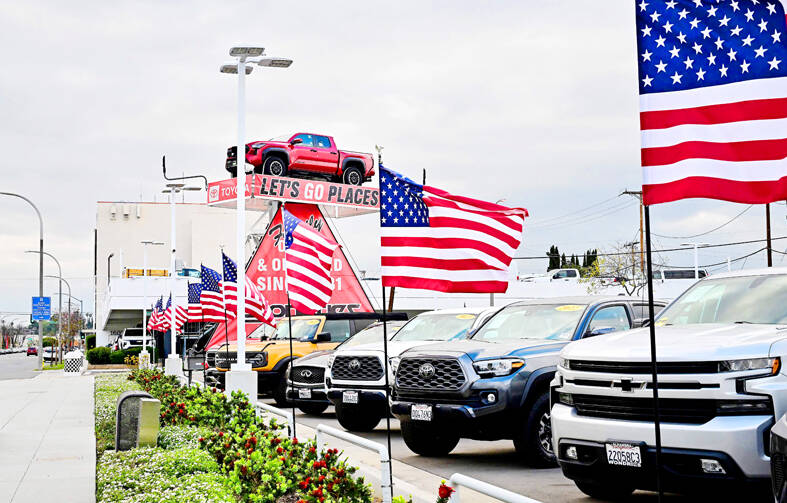US President Donald Trump declared on Saturday that he “couldn’t care less” if automakers increase US car prices in the wake of his imposition of import tariffs.
There have been reports that Trump threatened auto executives with reprisals if prices jump, but he told NBC News that increasing prices would simply help US-based manufacturers.
“I couldn’t care less. I hope they raise their prices, because if they do, people are gonna buy American-made cars. We have plenty,” he told NBC host Kristen Welker.

Photo: AFP
Trump on Thursday imposed a blanket 25 percent import tariff on cars and light trucks made outside the US, due to take effect on Thursday.
Tariffs would be delayed for car parts from countries covered by a US trade pact with Mexico and Canada, as officials try to disentangle the mixed supply chain.
Otherwise, Trump intends for the import levy to be permanent to boost US production and, in his view, save the US auto industry.
That would be particularly painful, because the US auto sector relies on a complex global supply chain, sometimes involving multiple border crossings, with assembly in one country of parts manufactured in others.
The manufacturing process at Ford Motor Co and General Motors Co depends largely on a highly complex back-and-forth between the US, Mexico and Canada — the three countries linked by the US-Mexico-Canada Agreement (USMCA), a free trade agreement signed by Trump during his first term.
However, Trump’s decree does not provide exemptions for imports under the USMCA, dashing industry hopes that car parts would be spared.
The tariffs include “crucial parts” — engines, transmissions, powertrains and electrical components are on the list that could be expanded.
Parts not originally manufactured in the US would face 25 percent tariffs, just like finished foreign vehicles.
The White House said that of the 16 million new vehicles sold in the US last year, half were assembled in the country, but contained only 40 to 50 percent US-made components.
Asked by NBC News what his message would be to worried auto executives, Trump said: “The message is ‘congratulations.’”
“If you make your car in the United States, you’re going to make a lot of money,” he said.
The US president’s goal is to increase manufacturing at home, but relocating factories or reconfiguring a supply chain cannot happen overnight.
Experts have no doubt that there would be a price increase for new vehicles in the US, which would subsequently affect a weakened used-car market, as owners keep their vehicles longer.
The cost of an affected new vehicle could increase by 9 to 12 percent, or US$4,000 to US$5,300, JPMorgan Chase & Co anticipates.

Taiwan will prioritize the development of silicon photonics by taking advantage of its strength in the semiconductor industry to build another shield to protect the local economy, National Development Council (NDC) Minister Paul Liu (劉鏡清) said yesterday. Speaking at a meeting of the legislature’s Economics Committee, Liu said Taiwan already has the artificial intelligence (AI) industry as a shield, after the semiconductor industry, to safeguard the country, and is looking at new unique fields to build more economic shields. While Taiwan will further strengthen its existing shields, over the longer term, the country is determined to focus on such potential segments as

UNCERTAINTY: Innolux activated a stringent supply chain management mechanism, as it did during the COVID-19 pandemic, to ensure optimal inventory levels for customers Flat-panel display makers AUO Corp (友達) and Innolux Corp (群創) yesterday said that about 12 to 20 percent of their display business is at risk of potential US tariffs and that they would relocate production or shipment destinations to mitigate the levies’ effects. US tariffs would have a direct impact of US$200 million on AUO’s revenue, company chairman Paul Peng (彭雙浪) told reporters on the sidelines of the Touch Taiwan trade show in Taipei yesterday. That would make up about 12 percent of the company’s overall revenue. To cope with the tariff uncertainty, AUO plans to allocate its production to manufacturing facilities in

COLLABORATION: Given Taiwan’s key position in global supply chains, the US firm is discussing strategies with local partners and clients to deal with global uncertainties Advanced Micro Devices Inc (AMD) yesterday said it is meeting with local ecosystem partners, including Taiwan Semiconductor Manufacturing Co (TSMC, 台積電), to discuss strategies, including long-term manufacturing, to navigate uncertainties such as US tariffs, as Taiwan occupies an important position in global supply chains. AMD chief executive officer Lisa Su (蘇姿丰) told reporters that Taiwan is an important part of the chip designer’s ecosystem and she is discussing with partners and customers in Taiwan to forge strong collaborations on different areas during this critical period. AMD has just become the first artificial-intelligence (AI) server chip customer of TSMC to utilize its advanced

Chizuko Kimura has become the first female sushi chef in the world to win a Michelin star, fulfilling a promise she made to her dying husband to continue his legacy. The 54-year-old Japanese chef regained the Michelin star her late husband, Shunei Kimura, won three years ago for their Sushi Shunei restaurant in Paris. For Shunei Kimura, the star was a dream come true. However, the joy was short-lived. He died from cancer just three months later in June 2022. He was 65. The following year, the restaurant in the heart of Montmartre lost its star rating. Chizuko Kimura insisted that the new star is still down